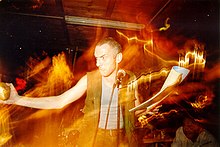Reading stage
A reading stage is a form of literary event in which a permanent ensemble of authors (possibly supplemented by guests) regularly - e.g. B. weekly or monthly - presenting self-written, often entertaining texts in front of an audience at the same place.
term
In 1987 Jörg Mantzsch founded the reading stage "Erich Weinert" in Magdeburg together with the Kulturbund. The first performance, at which young writers from circles and working groups with songwriters took turns in the performance and which was followed by a broad discussion, unexpectedly more visitors came than the space of the Erich Weinert memorial could accommodate. After only a few events, however, this reading stage was discontinued by the state with the argument that dissidents would find a podium here .
In 1990, Der Frühschoppen (initially as "Dr. Seltsams Frühschoppen") was founded in the Berlin scene and continues to perform weekly in the Schlot art factory to this day.
The term “reading stage” became popular towards the end of the 1990s to describe the phenomenon of what was then a very special form of personally connected reading groups. In a broader sense, any stage presentation that gives priority to reading could be described as a reading stage, but today the term is essentially used when the following basic elements can be found:
- Reading stages form a permanent team without a competitive character (in contrast to poetry slams ).
- The focus is on read texts (as opposed to memorized or improvised comedy numbers or the like).
- The event takes place regularly, usually on a weekly or monthly basis.
- The presented texts are written by myself.
- The show character of the events sets these readings apart from e.g. B. the literary salon , where the texts are discussed after the presentation.
- The texts presented are short, their duration rarely exceeds ten minutes.
In some reading platforms, deviations from these characteristics can be observed. A definition of the phenomenon of reading stages on the basis of the text content ("everyday" texts, big city texts, politically left-wing etc.), as it was attempted at times by both their protagonists and the press, is not tenable due to the differentiation in content and text. Even external characteristics of the first reading stages (everyday clothing, reading while standing, permanent presence on the stage) are not to be counted among the decisive characteristics, although they are still frequent characteristics.
Although more and more mixed forms are emerging, the reading stages are to be distinguished in particular from:
The phenomenon of reading stages is probably limited to the German-speaking area.
history
The development of the reading stages can be found in Berlin at the time of the fall of the wall and in Munich in the late 80s and early 90s.
- 1988: Mocking newsreel
- 1989: Wednesday conclusion
- 1990: Dr. Strange morning pint
- 1993: The White Feathers of Time
The boom of the reading stages came about ten years later, when the Berlin reading stages increased every year, then the national press became aware of this subcultural phenomenon and finally some authors also became commercially successful with publishers (e.g. Wladimir Kaminer , Jochen Schmidt and Jakob Hein ).
Although this type of event originated in Munich and Berlin, there are now events in other German cities that are called “reading stages”.
Publications
See also
literature
- Dan Richter : The Berlin reading stages . 2004 (presentation from the personal point of view of a reading stage member).
- Kolja Reichert: Tuscany can wait - How Berlin reading stage authors stay afloat . In: Der Tagesspiegel . August 18, 2006.
- Markus Schneider: Berlin reading stages . In: Goethe-Institut magazine KuBus . No. 74 , 2006.
- Sarah Bosetti, Andreas Scheffler, Volker Surmann: We would like to grow old with you - 30 years of Berliner Lesebühnen , Satyr, 2019
